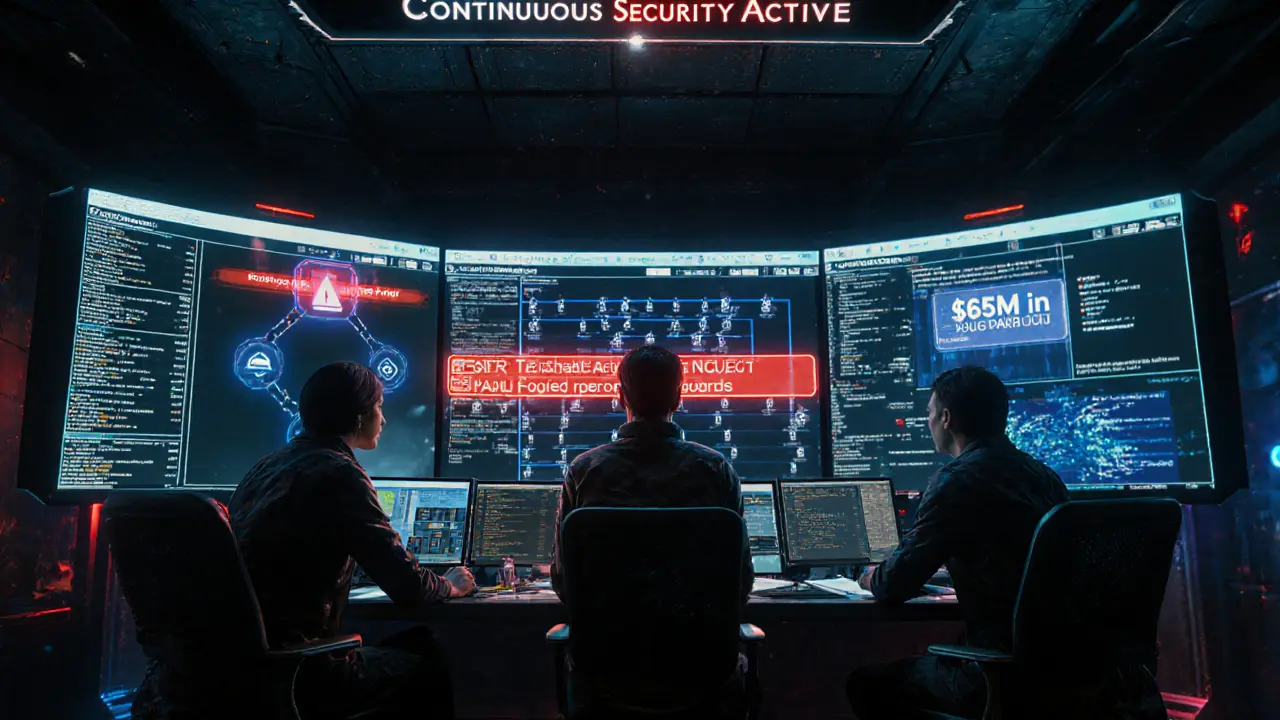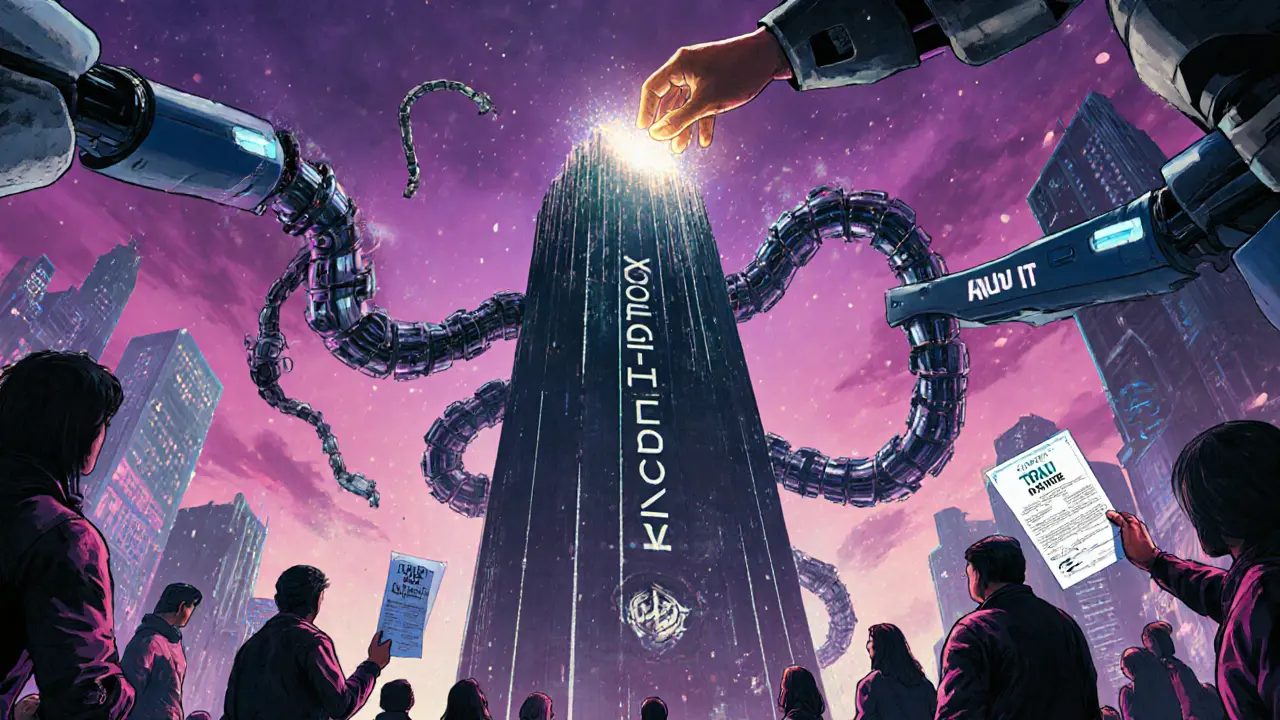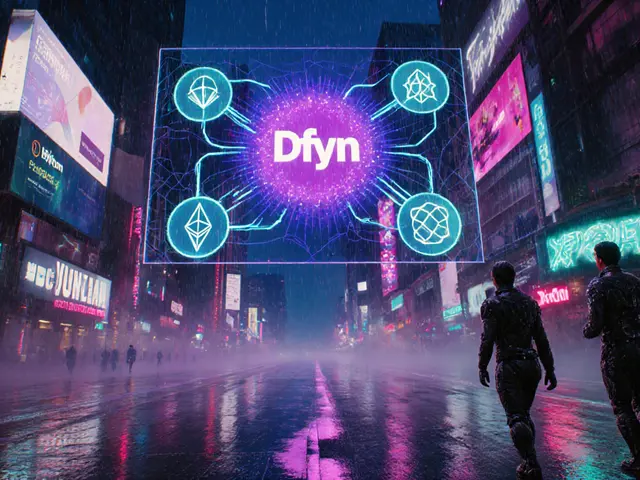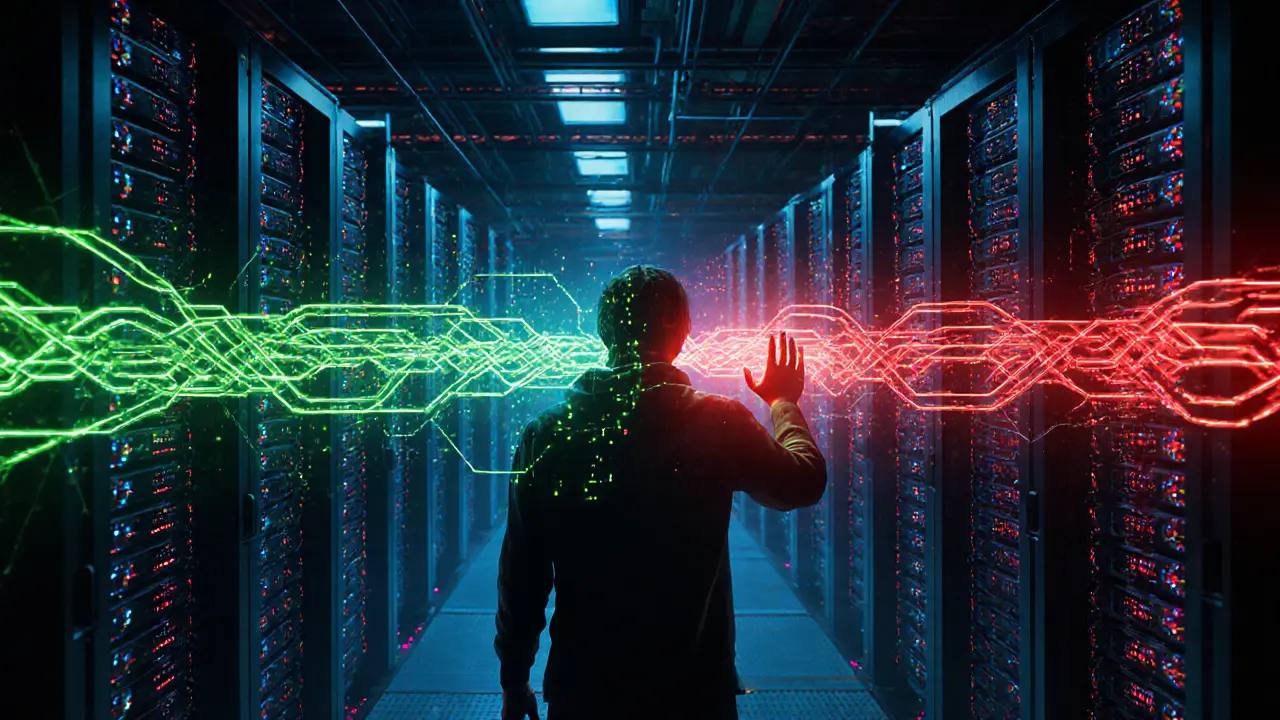Smart Contract Audit Cost vs. Risk Calculator
Determine whether the cost of a security audit is justified by calculating potential losses from un-audited contracts versus audit costs. Based on real-world data showing that 80% of $2.2 billion lost in 2024 came from un-audited contracts.
Security Analysis Results
Every year, billions of dollars vanish from blockchain protocols-not because of hacking the network, but because of bugs in the code. In 2024 alone, over $2.2 billion was stolen from smart contracts. That’s not a glitch. That’s a failure in how these contracts were reviewed before going live. If you’re building or investing in a decentralized app, smart contract audit isn’t optional. It’s the last line of defense.
Why Smart Contract Audits Fail (Even When Done)
You’d think if a team hires an auditor, their contract is safe. But here’s the harsh truth: most major exploits in 2024 happened on contracts that had been audited. Why? Because audits aren’t magic. They’re only as good as the process behind them. Many teams treat auditing like a checkbox. They pay a firm, get a report saying "no critical issues," and deploy. But that report might miss a subtle logic flaw in how tokens are transferred between protocols. Or it might not catch how a new DeFi strategy interacts with a third-party oracle in a way that lets attackers drain funds. The real problem? Audits are static. They look at code at one point in time. But blockchains move fast. A contract that’s secure today can become vulnerable tomorrow if it’s upgraded, integrated with a new protocol, or if a new attack pattern emerges. That’s why one-time audits are no longer enough.The Five-Stage Smart Contract Audit Process
A real audit isn’t a single review. It’s a structured, multi-stage process. Here’s how top firms do it in 2025.- Discovery and Scope Definition - Before writing a single line of code, auditors sit down with the team. What does this contract actually do? How many tokens are involved? Which protocols does it interact with? They map out every module, every external call, every possible entry point. Without this, you’re flying blind.
- Static and Formal Analysis - Tools like Slither and MythX scan the code for known patterns: reentrancy bugs, integer overflows, unchecked external calls. But the real power comes from formal verification. Tools like Move Prover mathematically prove that the code behaves exactly as intended under all conditions. This isn’t just checking for errors-it’s proving correctness.
- Manual Code Review - This is where humans shine. Automated tools miss logic flaws. A human auditor looks at how assets flow through the contract. Do users have too much control? Can an admin freeze funds? Is there a backdoor hidden in a complex function? They trace every possible path an attacker could take.
- Risk Reporting - A good report doesn’t just say "bug found." It ranks issues by severity: Critical, High, Medium, Low. It explains exactly how to fix it. Not just "change this line," but "here’s why this line is dangerous and here’s the secure alternative." It includes diagrams of attack paths and code snippets showing the fix.
- Remediation and Verification - The audit doesn’t end when the report is delivered. The team fixes the code. Then, the auditors re-test. They check that the fix didn’t break something else. This cycle repeats until every critical issue is resolved. Skipping this step is like fixing a leaky roof but not checking if the water still seeps through.
Most audits take 2-6 weeks. Complex protocols like multi-chain lending platforms can take longer. Rushing this process is the biggest mistake teams make.
Tools of the Trade: What Auditors Actually Use
You can’t audit smart contracts with a text editor. You need the right tools-and knowing which ones to use matters.- Slither - The most widely used static analysis tool for Solidity. It finds over 90% of common vulnerabilities in controlled tests. It’s fast, open-source, and integrates with CI/CD pipelines.
- MythX - A cloud-based platform that combines static and dynamic analysis. It’s especially good at finding reentrancy and logic flaws that Slither misses.
- Move Prover - For Aptos and Sui contracts written in Move. It’s the only tool that can formally verify Move code. If you’re building on Sui, you need someone who knows this tool inside out.
- Diligence Fuzzing - Generates random inputs to test edge cases. It found a critical flaw in a major DeFi protocol in 2023 by simulating 10 million transaction sequences.
- Hardhat and Truffle - Not auditors themselves, but essential for testing. They let you simulate the entire blockchain environment locally before deploying.
But tools alone won’t save you. A team using Slither might miss a vulnerability that a human catches because they’ve seen it before in a similar contract. That’s why the best audits combine automated scanning with expert manual review.

Choosing the Right Audit Firm
Not all audit firms are created equal. Some specialize in Ethereum. Others in Move. Some are great at formal verification. Others excel at penetration testing.- OpenZeppelin - The go-to for Ethereum-based DeFi. They built the standard ERC-20 and ERC-721 contracts. If you’re using common Ethereum standards, they know them better than anyone.
- Trail of Bits - For complex, high-risk systems. They’ve audited critical infrastructure like Ethereum’s deposit contract. They use formal methods and deep code analysis. Their audits are expensive but worth it for high-value protocols.
- Sigma Prime - Focused on consensus layer security. If your project interacts with Ethereum 2.0 validators or staking systems, they’re the experts.
- Move-Specific Auditors - If you’re building on Sui or Aptos, don’t hire a firm that only knows Solidity. Move is a different language with different risks. Look for firms with published audits of Move contracts on GitHub.
Ask for case studies. Ask for their GitHub. Ask how long their audits take. If they promise a 3-day audit for a $10 million protocol, walk away. Real audits take time. And if they won’t show you past work, they’re hiding something.
The New Standard: Continuous Security
The old model-audit once, deploy forever-is dead. In 2025, the smartest projects use continuous security.- Real-time Monitoring - Platforms like CertiK and PeckShield now offer 24/7 monitoring. They watch for unusual transaction patterns, unexpected fund movements, or sudden changes in contract state. One platform stopped a $100 million exploit in 2023 by flagging a rogue transaction within seconds.
- Bug Bounty Programs - Platforms like Immunefi pay ethical hackers to find flaws. In 2023, they paid out $65 million in rewards. A well-run bounty program can catch what even the best auditors miss.
- On-Chain Governance Integration - Some protocols now tie security alerts directly to their governance system. If a critical flaw is detected, the community votes on an emergency freeze or upgrade.
Think of it like car safety: you don’t just get your car inspected once. You check the brakes every few months. You replace worn parts. You install a tracker. Smart contracts need the same approach.

What You Can Do Right Now
You don’t need to be a blockchain developer to protect your assets. Here’s what to do:- If you’re investing in a DeFi protocol: Check if it’s been audited by a reputable firm. Look up the audit report. Don’t just trust the "audited" badge on their website.
- If you’re building a contract: Don’t skip the discovery phase. Document everything. Write clear specs. Don’t assume the auditor will figure out your intent.
- If you’re using a new protocol: Wait 2-4 weeks after launch. Watch for bug bounty reports. Check if the team is responsive to security feedback.
- If you’re on Sui or Aptos: Make sure your auditor knows Move. Don’t assume Solidity expertise transfers.
Security isn’t a one-time cost. It’s an ongoing investment. The projects that survive are the ones that treat code like a live system-not a static file.
What’s Next for Smart Contract Security
The future of auditing isn’t just better tools. It’s smarter ones.- AI-Powered Analysis - New tools now use natural language processing to understand what the code is supposed to do. If a function says "only allow owner to withdraw," but the code lets anyone call it, the AI spots the mismatch.
- Game Theory Integration - For DeFi protocols with complex incentives, auditors now model how rational actors might exploit the system. It’s not just about code-it’s about human behavior.
- Zero-Knowledge Audits - Some firms are testing ways to verify security without exposing the full code. This helps private protocols stay secure without leaking their secrets.
Regulators are starting to take notice too. In the EU and U.S., new proposals require formal security assessments for DeFi projects above certain TVL thresholds. Compliance will soon be mandatory, not optional.
The bottom line? If your smart contract holds value, it deserves a real audit. Not a quick scan. Not a template report. A deep, thorough, human-led process backed by tools, time, and expertise. Anything less is gambling with your money.
What happens if I skip a smart contract audit?
Skipping an audit is like launching a car without brakes. In 2024, over 80% of the $2.2 billion lost in crypto exploits came from contracts that were never properly audited-or were audited by inexperienced teams. Once deployed, smart contracts can’t be easily changed. If there’s a flaw, attackers will find it, drain funds, and disappear. There’s no undo button.
How much does a smart contract audit cost?
Prices vary based on complexity. A simple ERC-20 token audit might cost $10,000-$25,000. A full DeFi protocol with lending, staking, and cross-chain integrations can cost $50,000-$200,000. The most complex projects, like those using formal verification or multi-chain architecture, may exceed $300,000. Cheaper audits often mean missed vulnerabilities.
Can automated tools fully replace human auditors?
No. Tools like Slither and MythX catch about 90% of known vulnerabilities, but they miss logic flaws, economic exploits, and subtle interactions between contracts. A human auditor can spot that a function allows a user to bypass a check by calling another contract in a specific order-something no tool currently predicts reliably. The best audits combine both.
What’s the difference between auditing Solidity and Move contracts?
Solidity (used on Ethereum) is more flexible but easier to misuse. Move (used on Sui and Aptos) is designed to be safer-no reentrancy, stricter resource handling-but has its own risks like incorrect resource ownership or improper module access. Auditing Move requires familiarity with Move Prover and MoveFuzz, tools that most Solidity auditors don’t use. Never assume a Solidity auditor can audit Move code.
How long should a smart contract audit take?
A basic audit takes 2-3 weeks. Complex protocols take 4-6 weeks or more. If a firm promises a 1-week audit for a multi-million dollar DeFi app, they’re cutting corners. Real audits require deep analysis, manual review, and retesting. Speed is the enemy of security.
Are bug bounties enough instead of audits?
No. Bug bounties are a great supplement, but they’re reactive. They wait for someone to find a flaw. Audits are proactive-they look for problems before anyone exploits them. The best approach combines both: a thorough audit before launch, then a bug bounty program to catch what was missed.
What should I look for in an audit report?
A good report includes: severity ratings (Critical/High/Medium/Low), clear descriptions of each issue, exact code locations, step-by-step remediation steps, and proof of fixes after retesting. Avoid reports that just say "no critical issues" without details. If it doesn’t explain what was found and how to fix it, it’s not useful.








Comments
14 Comments
Laura Hall
bro i just deployed a token and paid $5k for an 'audit' and it got hacked 2 days later. the report just said 'no critical issues' and i was like... wtf? they didn't even check the mint function. so much for professional services.
Arthur Crone
if you need an audit you're already too late. real devs write secure code from day one. stop outsourcing your incompetence to firms that charge $200k to say 'this is bad'.
Michael Heitzer
the real issue isn't the tools or the firms-it's the mindset. people treat code like it's a static product, not a living system. you wouldn't buy a car and never check the brakes again. why treat your smart contract any differently? continuous monitoring, bug bounties, and community oversight aren't extras-they're the baseline now. if you're still thinking 'audit once and forget,' you're not just risky, you're delusional.
Rebecca Saffle
all this talk about audits is just rich people's insurance. if you're not worth $10M in TVL, you don't need a $100k audit. you need to stop pretending you're a bank. most of these projects are just memes with code.
Adrian Bailey
man i just read this whole thing and wow. i had no idea how deep this goes. i thought audits were just running a script and getting a pdf. turns out it's like a full forensic investigation with diagrams and math proofs? and move prover? never heard of it. i'm building a small NFT thing on ethereum, should i even bother? or is it overkill? also i'm kinda scared now lol.
Rachel Everson
if you're reading this and you're a dev-don't skip the discovery phase. i've seen so many teams rush into code because they're excited. write down what you want to do. draw it. explain it to a friend. if they don't get it, your contract won't either. audits aren't just for hackers-they're for clarity.
Johanna Lesmayoux lamare
audit reports should include attack paths. period.
ty ty
so you're telling me i need to pay $200k so some guy with a fancy title can tell me my code is bad? and you call this innovation? we're literally paying wizards to say 'your spell is broken'
BRYAN CHAGUA
the fact that we're even having this conversation says something about the state of blockchain. security shouldn't be an afterthought-it should be the foundation. the projects that survive will be the ones that treat code like it's holding people's life savings, not just another feature to ship.
Debraj Dutta
in India, many startups skip audits due to cost. but i've seen projects fail because of simple reentrancy bugs. maybe we need more affordable, open-source audit frameworks. community-driven audits could be the future.
tom west
openzeppelin? trail of bits? please. these firms are glorified consultants who charge absurd rates and still miss basic logic flaws. the real experts are the ones on github who find exploits for fun and get paid in bounties. if you're hiring a firm because you're scared, you're already doomed. stop outsourcing your fear.
dhirendra pratap singh
OMG I JUST GOT HACKED AND IT WAS BECAUSE I USED A $5K AUDIT FROM SOME GUY ON FIVERR 😭😭😭 MY WHOLE LIFE SAVINGS GONE BECAUSE SOMEONE SAID 'NO CRITICAL ISSUES' AND I TRUSTED THEM 😭😭😭 I'M SO STUPID 😭😭😭
Ashley Mona
you know what's wild? the best audits aren't the ones that find the most bugs-they're the ones that make you go 'ohhhhhhh' because they explain why something that looked fine is actually a disaster. like that one time someone showed me how a 'safe' token transfer could be hijacked by a flash loan combo. mind blown. 🔥
Joanne Lee
While the article correctly emphasizes the necessity of structured, multi-stage audits, it overlooks the human factor in implementation. Many teams hire auditors not for security, but for marketing-using the audit as a trust signal to investors rather than a genuine risk mitigation tool. This creates a perverse incentive: auditors are pressured to deliver clean reports, even if minor issues persist. The result is a false sense of security. A truly robust system requires not only technical rigor but institutional transparency-publishing audit timelines, auditor conflicts of interest, and remediation logs. Without accountability, even the most sophisticated tools become theater.
Write a comment